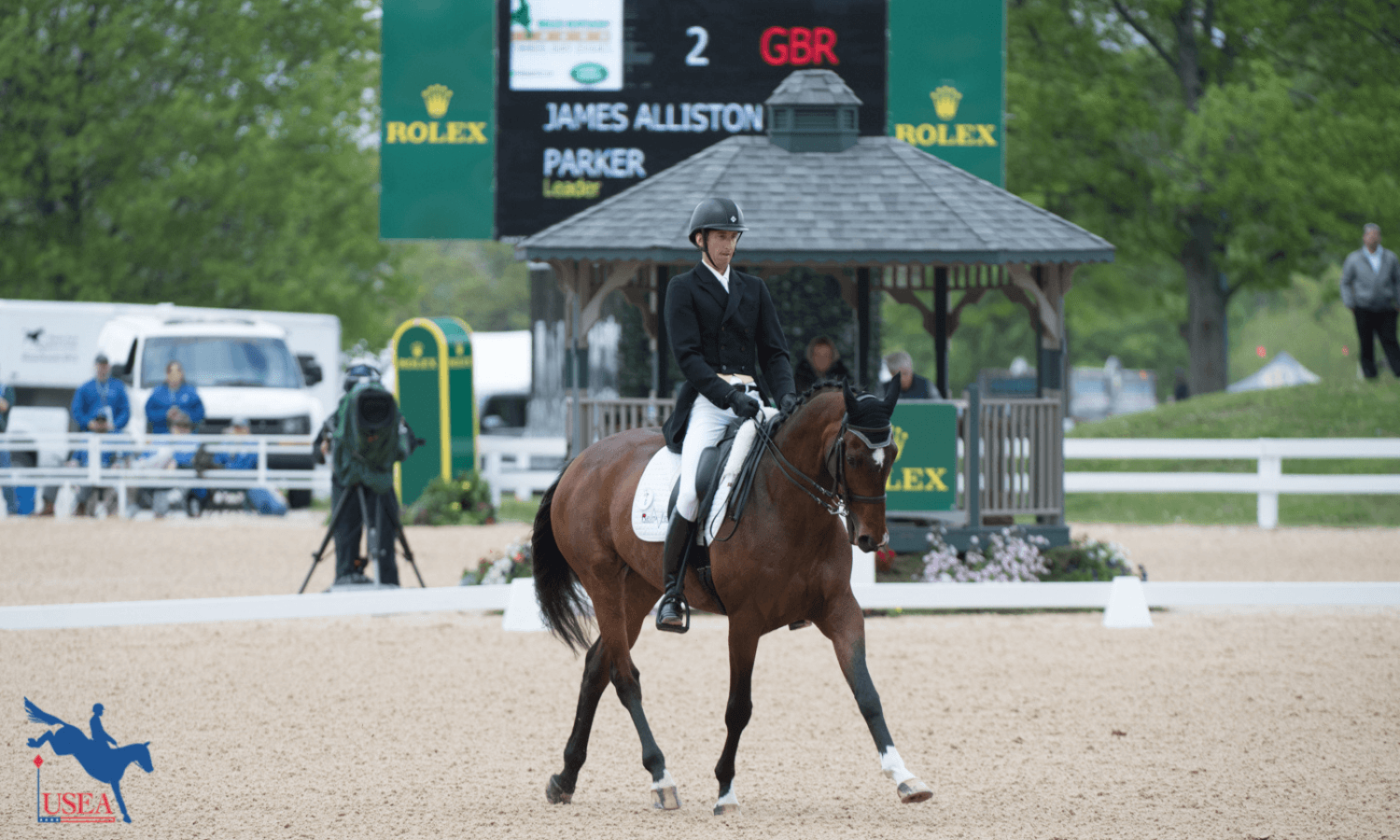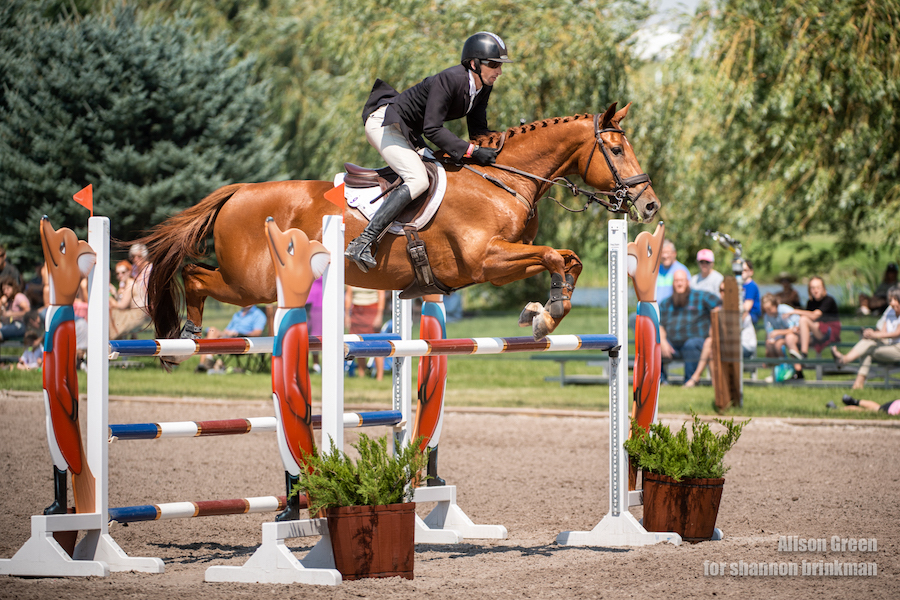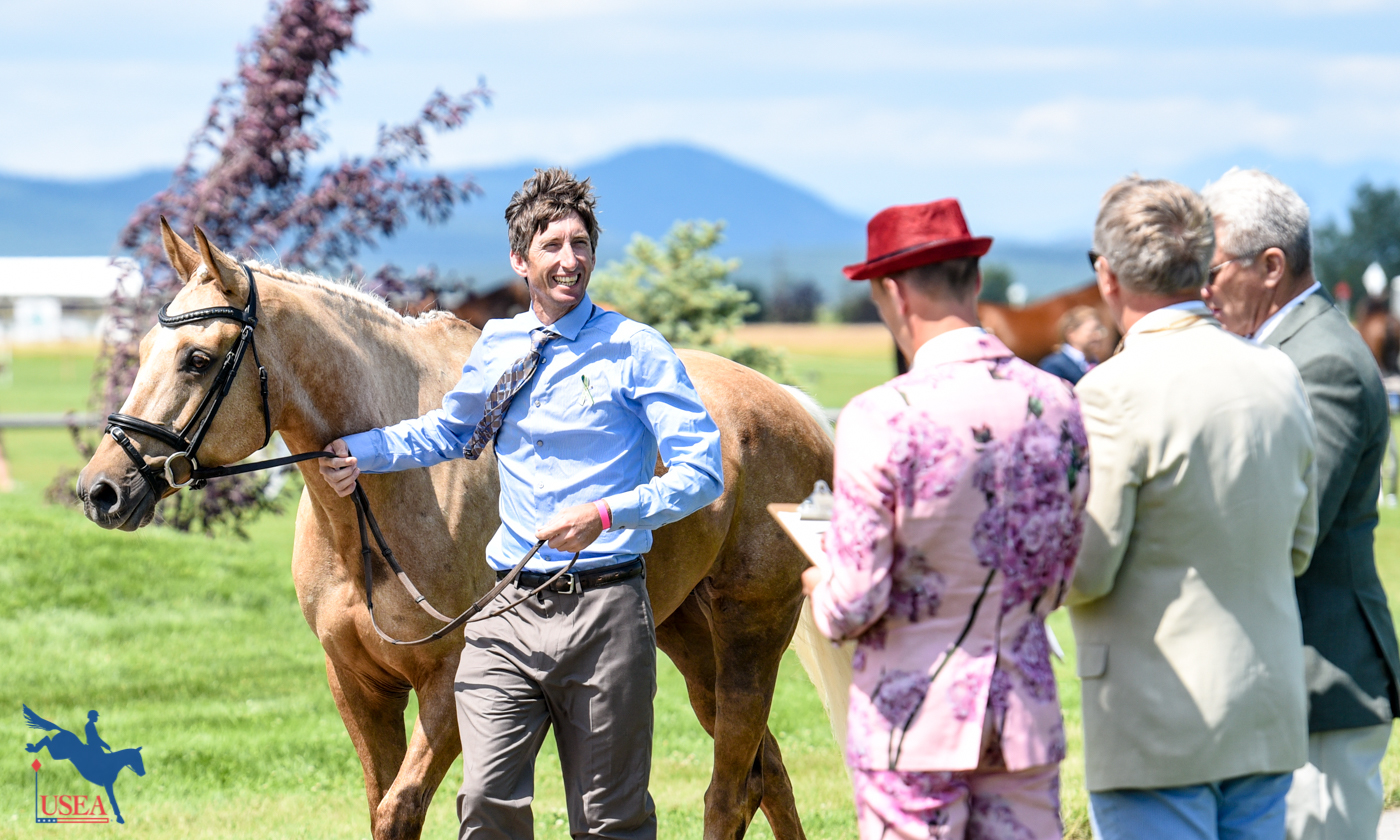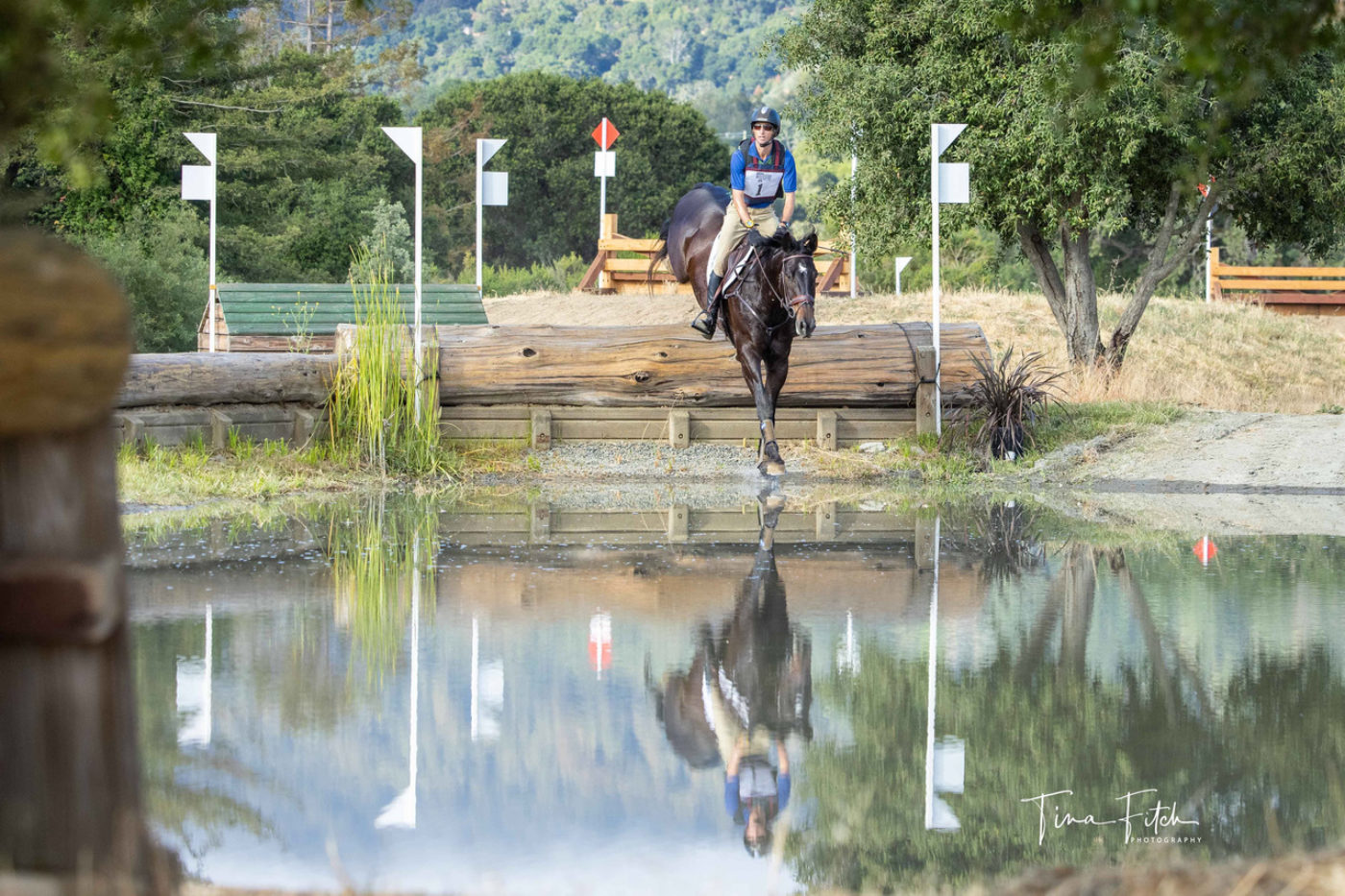Eleven Questions with James Alliston

James Alliston made out like a king earlier this summer at The Event at Rebecca Farm with wins in the CCI4*-L and CCI3*-L aboard Paper Jam and Nemesis respectively. We caught up with Alliston to chat about his horses, competing on the West Coast, his time in the States, and how it compares to competing in England.
Q: Tell us a little bit about your current string of horses.
A: Paper Jam is pretty new to four-star - [Rebecca Farm] was his first CCI4*-L. He is probably my number one horse at the moment. Nemesis is possibly my most competitive horse. He’s young at only 7, but he does everything well and in the way, I would like, so I am hoping his competitive nature will keep going at CCI4* next year. I have had him since he was a yearling; he’s always been very straightforward and a very easy horse.

I also have Pandora, who did a CCI4*-L a couple of years ago. She’s had some leg troubles so she’s just coming back now. She is my other Advanced horse alongside Paper Jam. Then also I’ve got Czechers, who did the CCI3*-L in Montana; he’s done an Advanced and I’m hoping to take him to a CCI4* at the end of this year.
I have a few three-star horses which will all finish up the year at the same level; Nemesis and [RevitaVet] Calaro will all do another CCI3* at the end of the year, but Czechers has already done one advanced so I am hoping he can finish up the year at a four-star. His dressage is a little bit rough, so hopefully, we can improve that a touch. Paper Jam will also do another four-star at the end of the year, and then Pandora is just coming back so I don’t know if she will do a long-format competition, but she’ll do some horse trials and we’ll just make sure she’s sound and then next year we’ll go again.
Q: Do you plan to do the majority of those events on the West Coast?
A: I haven’t been to Kentucky in a few years, but if I am lucky enough to have a Kentucky horse we’ll go east for that. It’s pretty much all on the West Coast for me.
Q: What drew you to the States originally?
A: I came over for my gap year and worked for Bruce Davidson on the East Coast. He was really good to me and gave me a lot of opportunities to ride. I wanted to travel and I wanted to ride, and a lot of people I knew went over to Germany and France and so on, but I didn’t speak the language, so America was good because I was able to communicate! Bruce was quite well known in England by my generation because he spent a lot of time there when I was growing up. I don’t know if he was based there all the time, but he was one of those Americans who were always at Badminton - he won it in 1995. So he was a good person to go to in the U.S. because I had obviously heard of him and seen him ride and he was a big name.
Q: Why did you decide to stay here?
A: I was supposed to only stay for three months or so, but I really liked it and I was just riding so much. I only had one horse in England, and I had always wanted to ride horses and be an event rider, but, to be honest, I thought it probably wouldn’t happen because it’s so hard. I just thought, ‘here I’m getting a lot of reps and riding a ton of horses’, and I think that is what brings you on as a rider. It would’ve been crazy to leave it to all to go and ride one horse at home when I could ride ten out here.

Q: When, and why, did you then choose to move to the West Coast?
A: After my gap year I went back to university in England, but every holiday pretty much I would come back to Bruce’s and ride. I was actually riding at university as well, and then when I graduated, I went to work for Bruce full-time again for two or three years.
Then I got a phone call from a Californian barn asking if I wanted to be a trainer out there. At the time I’d never taught a lesson in my life, so I thought, ‘well, I can ride the horses, but I can’t teach anyone,' and life out here on the West Coast is mostly teaching people so I didn’t know whether to go. They said they’d fly me out and I could have a look around, see what I thought and just learn on the job! That was Chuck and Peggy Morrick at Raceland Equestrian Center, and I have only just moved.
I am not based at their facility anymore, but I’m literally half a mile down the road from there and I ride one of their horses for them. Eventing is very East-centric in America, but it has worked out well for me because I have carved out a path on the West where I think there is a smaller amount of professionals. I think it is hard to be an event rider in England for sure, but I think it is as hard on the East Coast too, and so I was able to find my place on the West Coast with slightly more opportunities.
Q: Do you find you have to travel a lot more because of living on the West coast?
A: We have to travel a ton, especially the CCI5* horses. Even Montana is a really big trip, and then you’ve got Kentucky as well. In England, I remember traveling down to Bicton when I was a kid and that felt like a massive trip and it was only about three hours! We would stop and let the horses off, and we would even overnight the day before because it felt such a long way, but now three hours is just down the road here.
The logistics of traveling I learned from talking to more experienced riders who have done it. Things like if the horses can be in box stalls that’s great because then they’re moving. We’ve also found places across the country which are good to overnight them; you do that just by trial and error.
You have to prepare the horses slightly differently in the week or so before the event, because you don’t want to work them really hard right before they travel, and then they need to rest a little bit right after they travel. So, you have to get them to peak fitness way out before the show. It can also be unbelievably hot anywhere in America; like when I was out in Pennsylvania on the East Coast, I didn’t necessarily think that would be a hot climate because it snows in the winter, but in the summer it is blazingly hot. Out here we don’t have as harsh winters, but in the summer, although it is a dry heat, it can easily be triple digits.
Q: Do you find the eventing scenes in the UK and U.S. differ?
A: In England, you’ve got the one-day events, but in America, it’s three-day shows, especially on the West Coast where there are no one-days at all. We leave Wednesday night, Thursday we practice, and then Friday, Saturday, Sunday you show. It is set up so you are away for a long time. The way it works with our business is that we bring the students with us so that we can keep teaching because even if you ride quite a few horses you still have a lot of time. It is, therefore, more set up for teaching students out here, because in England I don’t see how you’d have time to do that.
For example, in Montana, we took some trailers filled with both mine and the students’ horses and we all went together. I really enjoy that because then even if you fall off, but the students go well then, it’s still been a success, and vice versa, if the students aren’t so good then maybe my horses go good!
That is something I really like; that we go to the shows as a group, with the students, my horses, and the owners, and we have meals together and hang out in the evenings. You get to know these people really well and become good friends because we spend so much time together at the shows. Everyone comes to watch each other's rides and I really like that part of it. I think in England it is easy to just do your own thing, and you’re so busy that you don’t spend time with other people.
Q: Is there anything you miss about the UK scene?
A: Totally! America is not quite as good for producing a large number of horses because you can’t just go out mid-week and do a one-day event, and there aren’t that many shows so you can’t get them out so often. Producing horses is also very expensive to do in America; it’s hard to bring up the young ones in a financially viable way. Everything costs a fortune here. The ground is also better in England; out here we have a dry season and a wet season, and the ground does get pretty hard. People have to be careful buying horses from England where they’re used to good ground because there are not many shows here with that sort of going, so the feet have to be amazing for any horse coming into California. I actually had trouble with that because the ground is different, it’s not grass, and they do prepare it well, but there’s still a bit of a sting to it, so it’s not an easy transition for those used to springy, watered turf.

Q: Would you ever return to the UK?
A: Maybe down the line, but while I’m working it makes sense to stay here. I’ve carved out a business with my wife, who also rides at the Advanced level and who is the brains behind it all. We’ve worked really hard to create something where we are able to do what we love and make it work. I’m too old to be one of the many trying to make it work back in England!
Q: Can you tell me a bit about your business?
A: Well, we have a bit of everything. We have a riding school where we have four or five ponies, and where our older students teach. That is a constant; when we go to a show the riding school keeps going, so there is still income while we are away. We also buy and sell. We have owners like everyone tries to do. I did have a stallion - I just gelded and sold him, but I would like to do more of that because I definitely think there is a need for a nice eventing stallion out here in America. We also have our competition students, so, all morning my wife and I ride our horses, and then in the afternoon we teach. The working students come and go and we have a couple of grooms, a barn manager/scheduler who schedules all the lessons and makes sure we are doing what we are meant to be doing. The more experienced students come and help me ride as well. It is busy! We probably have 50 horses here so there is a lot of action and a lot going on.
Q: Would you consider swapping your nationality in the same way that Boyd Martin and Philip Dutton did?
A: Maybe! I’m not sure. When I was watching the Olympics, I was thinking, there is no chance I’d be getting on an English team; I think they could put their C team out and still have been really competitive. I remember seeing the list of riders who were the options for the Olympics, and they’d all won five-stars. I don’t have a horse at that level, and I don’t have those results yet, but hopefully down the line if I do, then we’ll see.















